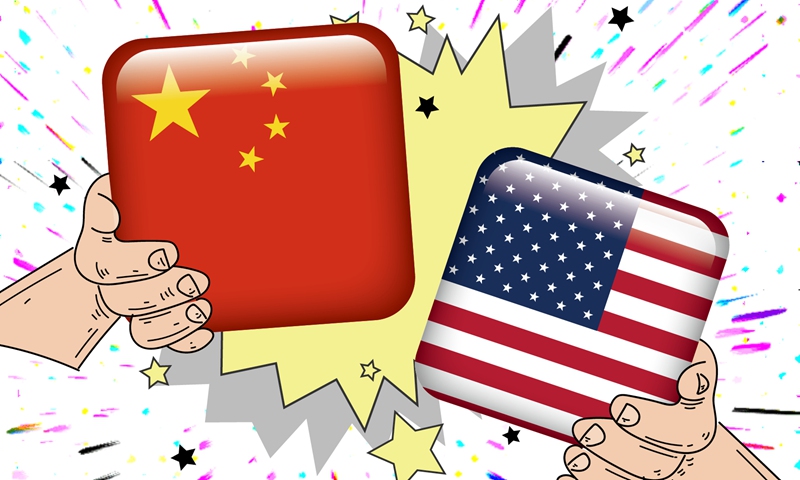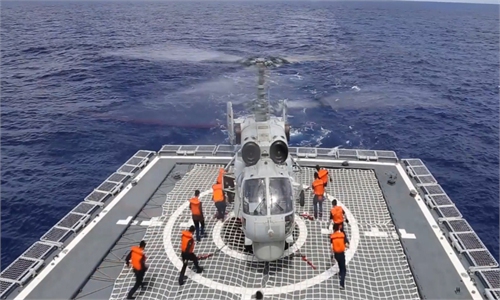'Guardrails' of China-US ties should be built from within Washington: Global Times editorial

China US Photo:Global Times
The US media outlets reported that Gen. Michael A. Minihan, who as head of Air Mobility Command oversees the Air Force's fleet of transport and refueling aircraft, blatantly predicted in a memo that the US could be at war with China over Taiwan two years from now. Such bombastic words startled the Pentagon and prompted Pentagon official to clarify immediately that "these comments are not representative of the department's view on China," which means the remarks only represent Minihan's own view. But for the outside world, the incident is not as simple as it appears.Minihan is a big mouth. The US media described him as being "known for incendiary speech, particularly about China." But he is not that special or rare within the US military. Similar voices have emerged one after another in the past few years, and they are all quite important people in the US military. Navy Admiral Charles Richard, commander of US Strategic Command, said in November at a conference that the Ukraine crisis is "just the warmup" and "the big one is coming," referring to a war with China.
These intimidating predictions about "an imminent war between China and the US" are all similar, while the only difference is the time. Minihan's "gut" told him that China and the US will fight within two years, which brings the time forward and creates an even more urgent atmosphere. Then commander of the US Indo-Pacific Command Adm. Philip Davidson, when testifying before the US Senate Armed Services Committee, claimed that China may try to attack Taiwan by 2027. The timing has been cited by some security analysts as "Davidson Window." Apparently none of these predictions is reliable.
However, we cannot yet regard these as just ravings. Combined with the actual actions and deployment adjustments of the US military in the Asia-Pacific region, we can see substantive subtexts from these "babblings."
The US military may have the intention of stimulating and deterring the Chinese mainland by talking big, but it is indeed making real preparations for a possible military conflict between China and the US, including military intervention in the Taiwan Straits to prevent China's reunification. What Minihan said in his memo is not simply from his gut, it represents the real attitude of some people in the US military. Behind Washington's frequent military deployments in the Asia-Pacific region under the banner of "peace," such belligerent forces are fermenting.
Now Washington often talks about establishing "guardrails" for China-US relations, but the forces trying to break the "guardrails" lie within. Recently, Washington has launched a "war without gunfire." According to US media reports, Japan and the Netherlands have reached an agreement with the US to restrict the export of advanced chip manufacturing equipment to China, which "marks a significant milestone in US efforts to work with allies." Some US media believe the two countries are helping the US. Obviously, in this semiconductor war launched by Washington, Japan, the Netherlands and other countries will only suffer the losses. "Helping America" is just a decent way of saying "serving as cannon fodder."
Some political elites in Washington are now obsessed with the fantasies of "crushing China," and are constantly fabricating threats or intimidating other countries to create momentum for themselves. However, going against the trend of peace and development makes them feel tired. But this didn't prompt them to reflect, but rather made them more anxious, which however pushes the world to be warier of an impulsive Washington. The hawkish statements of senior officials such as Minihan, and Washington building cliques on chip sector resonate with each other. They show that Washington has played a disgraceful and disruptive role in both issues of peace and development, and has essentially become the "source of chaos" for the entire world.
According to incomplete statistics, from the end of WWII in 1945 to 2001, the world witnessed 248 armed conflicts in 153 regions, of which 201 were launched by the US, accounting for about 81 percent. Even today, Washington still doesn't abandon the old dream of making big fortune through inciting conflicts. But both history and reality have showed that a country finds itself a wrong rival if it regards China as an enemy.
The more Washington clamors for war against China, the more it will inspire China's determination to defend its homeland and strengthen its national defense; the more Washington wants to besiege China in the high-tech sector, the more it will drive China's independent innovation. Whether it is at military level or in technological field, the benefits Washington gains from suppressing China will be far less than the price it must pay.

